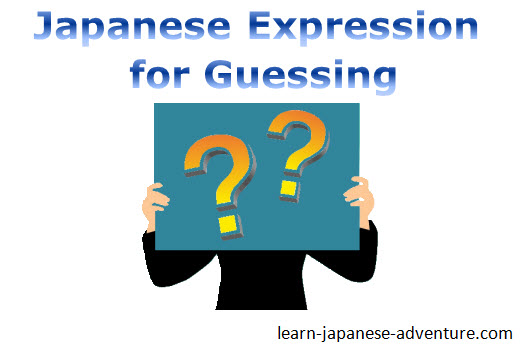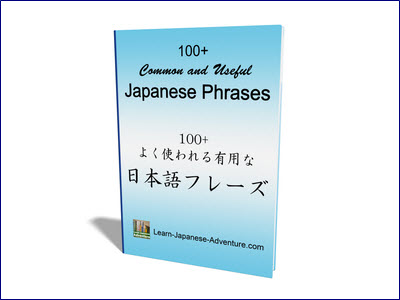- Home
- Intermediate Lessons
- Japanese Expressions for Guessing
Japanese Expressions for Guessing -
Intermediate Lessons: 11
In this lesson two Japanese expressions, でしょう (deshou) and かもしれません (kamoshiremasen) will be introduced.
They are both used to indicate that the speaker is making a judgement or guess about what may possibly happen.

However there are also differences between the two of them. Let's go through them one by one.
でしょう deshou
でしょう (deshou) is normally used to express the speaker's inference or guess from some information he or she has. The sentence patterns are as follow...
| Verb plain-form | でしょう |
| い-adjective plain-form | でしょう |
| な-adjective plain-form (~ |
でしょう |
| Noun plain-form (~ |
でしょう |
For example, after looking at the dark sky, you think that it's going to rain. You can say this...
- 空がとても暗いですから、雨が降るでしょう。
sora ga totemo kurai desu kara, ame ga furu deshou
Meaning: The sky is very dark, it will probably rain.
In fact, でしょう (deshou) is always used in the weather forecast in Japan.
When you are listening to the Japanese news next time, take note of whether the Japanese weathercaster has used this Japanese expression.
More Examples
|
1. |
あのレストランの前にはいつも大勢の人がいますから、有名 ano resutoran no mae niwa itsumo oozei no hito ga imasu kara, yuumei |
|
2. |
マイクさんは十年日本に住んでいましたから、たぶん奥さんは日本人 |
Some Points to Note
1. The adverb たぶん (tabun), which means "probably", is used quite often with でしょう (deshou), just like in example 2 above.
2. Sometimes だろう (darou) is used instead of でしょう (deshou), especially for man. And だろう (darou) is also the plain-form of でしょう (deshou).
3. When you are reading the above examples, the intonation for でしょう (deshou) is going down. However, if the intonation is going up, it becomes a question to someone and you are seeking his or her agreement. For example...
- あの人は田中さんでしょう。 ↘(intonation going down)
ano hito wa tanaka san deshou
Meaning: I guess that person is Ms Tanaka.
- あの人は田中さんでしょう。 ↗(intonation going up)
ano hito wa tanaka san deshou
Meaning: I guess that person is Ms Tanaka. Is my guess correct?
(You are guessing that person is Ms Tanaka. But you want to confirm that your guess is correct)
かもしれません kamoshiremasen
かもしれません (kamoshiremasen) is also used to express the speaker's inference or guess about what may possibly happen, though he or she cannot be absolutely certain.
When the speaker says かもしれません (kamoshiremasen), he or she is also aware that the opposite could be true. The degree of certainty is much lower than that of でしょう (deshou) in this case.
Both Japanese expressions share the same sentence patterns. So following that of でしょう (deshou), the sentence patterns of かもしれません (kamoshiremasen) are...
| Verb plain-form | かもしれません |
| い-adjective plain-form | かもしれません |
| な-adjective plain-form (~ |
かもしれません |
| Noun plain-form (~ |
かもしれません |
Examples
|
1. |
約束の時間に間に合わないかもしれません。 |
|
2. |
東京は今日寒いかもしれません。 |
|
3. |
山田さんは田中さんが好き |
|
4. |
鈴木さんの部屋は電気がついていません。もう部屋にいないかもしれません。 |
|
5. |
もしかしたら3月に卒業できないかもしれません。 |
|
6. |
大きい地震があるかもしれませんから、旅行の前に保険に入ろうと思っています。 |
Some Points to Note
1. In example 6, if I were to say 大きい地震があるでしょうから (ookii jishin ga aru deshou kara), it will sound very weird.
It's like I am predicting and are 90% sure that there will be a big earthquake happening and therefore I have to get the insurance.
Although we can't really predict whether an earthquake is going to happen, there is still a possibility that it may happen.
However the possibility is very much lower (may be 1% or lower). In this case, かもしれません (kamoshiremasen) is more appropriate.
2. The adverb もしかしたら (moshikashitara), which means "perhaps", is used quite often with かもしれません (kamoshiremasen), just like in example 5 above.
3. かもしれない (kamoshirenai) is the plain-form of かもしれません (kamoshiremasen).
Differences Between these Two Japanese Expressions
1. Degree of Certainty
Although both Japanese expressions でしょう and かもしれません are guesses, the degrees of certainty are different.
For でしょう, the speaker is more certain about the guess (80% to 90%). Whereas for かもしれません, the certainty is much lower. Maybe 50%, 20%, 10% or even 1%.
As such, the weathercaster in Japanese news will only use でしょう when forecasting weather. If the weathercaster uses かもしれません, no one will believe the forecast.
2. Prediction of Speaker's Volitional Action
でしょう cannot be used when predicting the speaker's volitional action. かもしれません, on the other hand can be used when referring to the speaker's own action or action of other people. For example...
- 私は来年結婚するでしょう。 X
watashi wa rainen kekkon suru deshou X
私は来年結婚するかもしれません。 O
watashi wa rainen kekkon suru kamoshiremasen O
Meaning: I guess I will marry next year.
3. Prediction of Future Event
でしょう is often used for prediction of future event.
Summary
In summary, depending on the situation that you are in, learn to use these two Japanese expressions でしょう and かもしれません correctly.
Ready Set Speak Sale! Get 40% OFF Forever on Premium & Premium PLUS plans! Ends on 18 Apr 2025
The link above is an affiliate link, which means that I would earn a commission (at no extra cost to you) if you do end up purchasing the related learning course.
Previous - Lesson 10: Expression for Hearsay
Buy me a coffee








Facebook Comments
Don’t see the comments box? Log in to your Facebook account, give Facebook consent, then return to this page and refresh it.